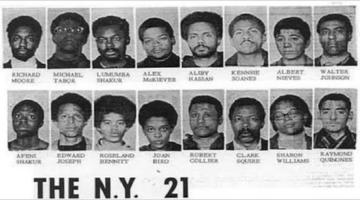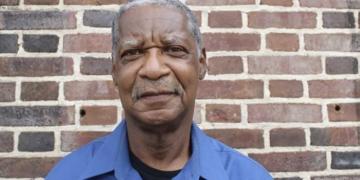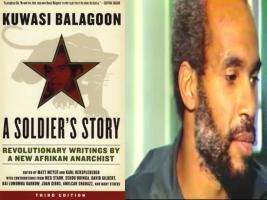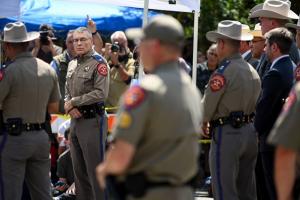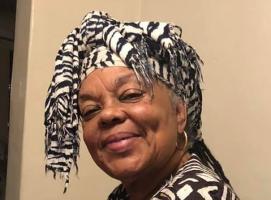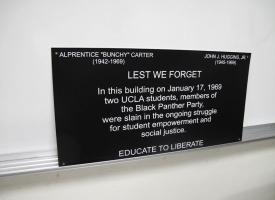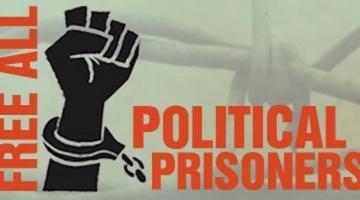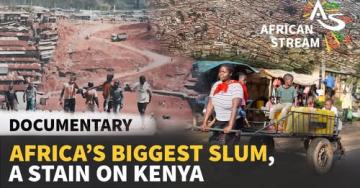Chicago cops laugh as they carry Fred Hampton's bullet-ridded body fromm the murder scene.
Hampton's body was dragged from the bloodstained bed to the hallway floor, to be displayed as the raiders' trophy
“He's good and dead now."
Introduction
Fifty-one years ago this past week, Illinois Black Panther leaders Fred Hampton and Mark Clark were slain by the Chicago police in a murderous pre-dawn raid. Over the next five decades the Hampton and Clark families, their lawyers, the Black Panther Party, movement activists, honest reporters and documentary filmmakers, and peoples’ historians have waged a continuous battle to uncover and speak the truth about Fred Hampton, the BPP, and the December 4th raid. These intergenerational and interracial efforts have led to a changing of the historical narrative from a shoot-out between the Panthers and the police, to a “shoot in” where the police fired more than 90 shots to one by the Panthers, then to a murder of Fred Hampton while he slept, drugged, in his bed, and now, to a political assassination orchestrated by the FBI under its notorious COINTEPRO program.
All of this work has led Hollywood to depict Fred Hampton in at least two major films made by megastar producers. In Aaron Sorkin’s “The Trial of the Conspiracy 7,” Hampton the character is fictionalized, a device to a worthy end - - - showing his murder as a significant event that occurred while the trial was happening.
Due out next year is Ryan Coogler’s “Judas and the Black Messiah,” which features a star-studded cast and focuses on, and contrasts, Fred with FBI informant William O’Neal, who set up Fred’s murder. The trailer warns that the movie is “inspired by true events.”
While an historical analysis of these movies must await another day, we must remember that to learn about the real Chairman Fred Hampton, his assassination, and the struggles that were waged to establish the narrative that these movies seek to depict, we must return to the sources that have lived, recounted, documented, recorded, and written about those events.
With that in mind, BAR Reprints an edited version of an article by the author that first appeared in Truthout on December 4, 2017.
“Intergenerational and interracial efforts have led to a changing of the historical narrative from a shoot-out between the Panthers and the police, to a ‘shoot in’ where the police fired more than 90 shots to one.”
In August 1967, notorious FBI Director J. Edgar Hoover sent out an urgent directive to all of his field offices under the file name "COINTELPRO-Black Nationalist Hate Groups." It instructed "Racial Matters"(RM) agents to take aggressive -- and highly illegal -- actions to "expose, disrupt, misdirect, discredit or otherwise neutralize the activities of Black-nationalist, hate-type organizations and groupings, their leadership, spokesmen, membership and supporters." On March 4, 1968, exactly one month before Martin Luther King Jr. was assassinated, another urgent Bureau-wide COINTELPRO directive from Hoover's desk instructed RM Agents to devise COINTELPRO actions designed to "prevent the rise of a 'messiah' who could unify and electrify the militant black nationalist movement."
On December 4, 1969 RM agents in the Bureau's Chicago office secretly congratulated themselves and hailed their "success" to Hoover for masterminding the bloody pre-dawn police raid that left Fred Hampton, the 21-year-old chairman of the Illinois chapter of the Black Panther Party (BPP) -- and most certainly a rising "messiah" -- and Peoria Panther leader Mark Clark dead, and several other young Panthers seriously wounded.
“Agents secretly congratulated themselves and hailed their ‘success’ to Hoover for masterminding the bloody pre-dawn police raid.”
From an early age, Hampton was a charismatic speaker and natural leader. At the age of 14, he had organized a student chapter of the NAACP in Maywood, Illinois, and the chapter soon grew to 700 members. He led a march on the Maywood Town Hall and organized to build an integrated swimming pool there. After he graduated from Proviso East High School, the administration asked him to come back to mediate a confrontation between Black and white students, then had him arrested when he did so. Influenced by Malcolm X, the Student Non-Violent Coordinating Committee (SNCC) and the realities that he observed and experienced in the movement, Hampton consistently spoke out strongly against police brutality. His politics became increasingly more militant.
In the fall of 1967, Hampton enrolled in Crane Junior College, later renamed Malcolm X College, which was a center of radical Black activity in Chicago. He continued his dynamic organizing there, and injected a new militancy into the student body. During 1968, Hampton, Bobby Rush and several others organized the Illinois chapter of the Black Panther Party and opened their offices at 2350 West Madison Street on the West Side of Chicago.
By this time, Hampton had been expressly targeted by the Chicago FBI office, which was already quite experienced in disruption tactics and techniques, having taken several sophisticated actions in the mid-60s that were designed to exploit and exacerbate the political division between Nation of Islam leaders Malcolm X and Elijah Muhammed. Within days of the opening of the Panther office, Chicago's Racial Matters Squad directed one of its operatives, William O'Neal, to join the Party. O'Neal soon maneuvered himself into a leadership position as chief of security, and served as Hampton's bodyguard during the early days of the Illinois chapter.
“The Chicago FBI office was already quite experienced in disruption tactics and techniques.”
Under the leadership of Chairman Fred Hampton and Minister of Defense Bobby Rush, the Chicago BPP grew into a strong organization. Hampton began to negotiate with Chicago street organizations, attempting to convince them to give up their violent activities and embrace the Panther philosophy. Under his leadership, the Party built the original Rainbow Coalition that united the Panthers, the Puerto Rican Young Lords Organization, the Young Patriots (a group of radical Appalachian whites) and the Students for a Democratic Society.
The BPP opened a Breakfast for Children program at several locations in the city, and fed hundreds of hungry young children before they went to school. Hampton frequently spoke at colleges and high schools and met with a wide range of leaders and organizations. He led by example, starting his day at six in the morning at the Breakfast program, and would never ask someone to do something he would not do, from selling the Panther newspaper to defending the Panther office from police attack.
At the same time, the FBI, both nationally and locally, was increasing its efforts to "neutralize the Panther Party and destroy what it stands for." Not only had the Bureau targeted the leadership, including Hampton, whom it registered on its Rabble Rouser, Agitator and Security Indexes, but it also specifically set out to destroy the BPP newspaper and the Breakfast program, as well as the Panthers' liberation schools and health clinics. Under the COINTELPRO banner, utilizing "ghetto informants" who often acted as provocateurs, Racial Matters operatives sought to exploit ideological differences and resultant tensions between the Panthers, street organizations and Black nationalist organizations. In Chicago, RM agents attempted to provoke the Blackstone Rangers to attack Hampton and the Panthers by sending a forged letter to Ranger leader Jeff Fort, that purported to warn him of a "hit" the Panthers had ordered against him -- with the stated goal of provoking Fort to physically attack Hampton. Continuing his work as a COINTELPRO operative, FBI informant O'Neal, who later played a key role in setting up the murderous December 4 raid by supplying the floor plan of Hampton's apartment, blossomed as a provocateur who repeatedly -- and unsuccessfully -- encouraged the commission of illegal acts.
“Agents attempted to provoke the Blackstone Rangers to attack Hampton and the Panthers.”
The local police and prosecutors also sought to destroy the BPP with a vengeance. Panthers were constantly harassed and arrested, often for selling the Panther paper. Hampton had been arrested in Maywood for allegedly taking $71 of ice cream and distributing it to neighborhood children. The politically aggressive Cook County state's attorney, Edward V. Hanrahan, put Hampton on trial for robbery. In May 1969 he was convicted and sentenced to two to five years in prison. In August, the Illinois Supreme Court granted Hampton appeal bond, and he returned to Chicago to a joyous welcome at People's Church on South Ashland Avenue. In an inspiring and memorable speech, he told of how he heard the "beat of the people," and was "high off the people" while he was locked up in a downstate maximum-security prison. Upon his release, Hampton immediately resumed his speaking and organizing at a breakneck pace. His unique leadership skills had been duly noted, not only by the FBI, but also by the national leadership of the BPP, and he was being groomed to be an important national spokesperson.
Three months later, Hampton lay dead on his bed in a pool of blood, assassinated by a Chicago police raider who shot him twice in the head at close range. Hampton was a victim of the FBI's COINTELPRO program.
As evidence emerged over time, it was established that the 14-man, pre-dawn police raiding party, operating under the direct supervision of State's Attorney Hanrahan, was armed with O'Neal's floorplan that marked the bed on which Hampton would be sleeping. They carried a submachine gun, semiautomatic rifles, shotguns and handguns. The raiders were led by Chicago police Sgt. Daniel Groth, a shadowy figure with suspected connections to the CIA, and included James "Gloves" Davis, so nicknamed because he donned gloves before he beat people up.
“Hampton was being groomed to be an important national BPP spokesperson.”
The raiders burst in the front and back doors of the tiny apartment, and Davis killed Mark Clark, who was just inside the front door, with a shot through the heart. They then charged into the front room, shooting Brenda Harris, a 17-year-old Panther who was lying on a bed next to the wall, and "stitched" that wall with machine gun and semiautomatic fire. These bullets tore through the wall and into the middle bedroom, where three Panthers were huddling on the floor, and many of those high-powered bullets continued through another wall into the bedroom where Hampton and his fiancé, Deborah Johnson, who was eight-and-a-half months pregnant, were asleep. The trajectories of many of these bullets were toward the head of Hampton's bed.
In the back bedroom, the mattress was vibrating from the gunfire as Panther occupants Louis Trueluck and Harold Bell were unsuccessfully trying to wake Hampton. The raiders burst through the back door, firing at the bedrooms. They then took Bell, Trueluck and Johnson out of the back bedroom into the kitchen, leaving Hampton alive but unconscious on the bed. In the front, the officer with the machine gun had moved to the doorway of the middle bedroom and fired several machine gun blasts at the defenseless occupants. Ronald "Doc" Satchel was hit five times, while Blair Anderson and another terrified teenager, Verlina Brewer, were also shot.
In the kitchen, Johnson and Bell heard two shots ring out from Hampton's bedroom, and heard a raider say, "He's good and dead now." The toxicological evidence strongly suggested that O'Neal had put secobarbital in Hampton's Kool-Aid hours earlier so that he would not wake up.
Hampton's body was dragged from the bloodstained bed to the hallway floor, to be displayed as the raiders' trophy, while the seven survivors were physically abused, subjected to threats and racial epithets, and then jailed on charges of attempted murder. The raiders then rushed from the apartment to the state's attorney's office where they appeared with Hanrahan at a press conference. There, Hanrahan described a fierce gun battle initiated by the "vicious" and "criminal" Black Panthers, during which his raiders acted "reasonably" and with "restraint."
As we now know, the official version was a false narrative, a lie. Over the next decade the full truth was brought to light, thanks to Chicago's Black and progressive communities, the families of Hampton and Clark, and the survivors of the raid, their lawyers, and their Panther comrades. With the awful truth on the public record, it is important to consider the present moment with that history in mind.
Flint Taylor is a founding member of the People’s Law Office in Chicago, and one of the lawyers for the Hampton and Clark families. He is the author of “The Torture Machine,” which documents the Hampton assassination in its first chapter. He also recommends “The Assassination of Fred Hampton,” by his longtime law partner and fellow Hampton lawyer Jeffrey Haas, the documentary film entitled “The Murder of Fred Hampton,” and the PBS Documentary “Eyes on the Prize Two, A Nation of Laws?”
Please join the conversation on Black Agenda Report's Facebook page at http://facebook.com/blackagendareport
Or, you can comment by emailing us at comments@blackagendareport.com


